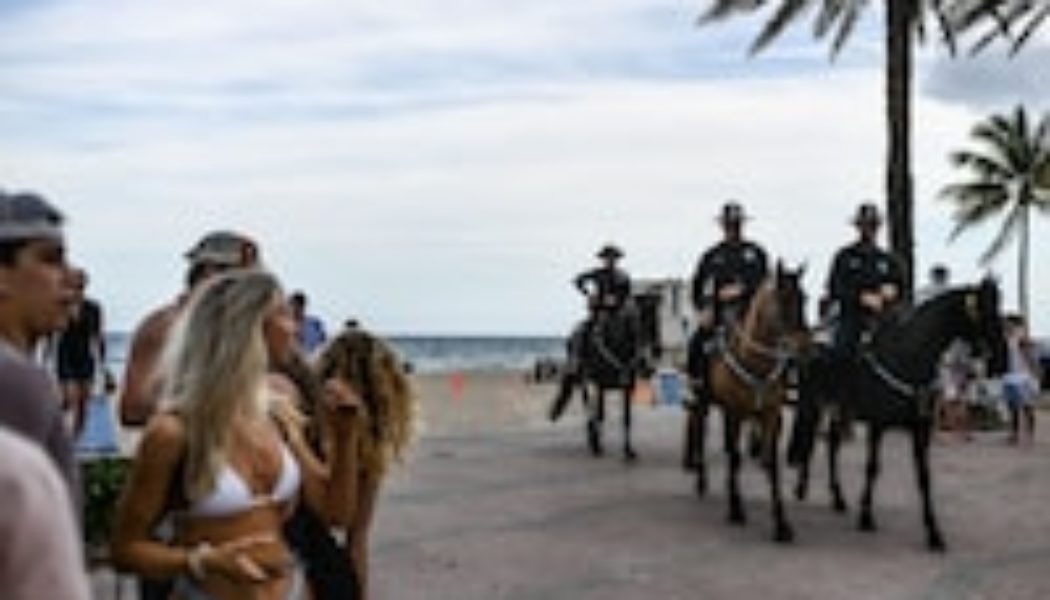
Florida beach towns and spring break have a long, sometimes sordid history. These days, the relationship is complicated.
Visitors pump billions of dollars into Florida’s economy; last year, an estimated 135 million people visited the state. But as high-schoolers, college students and adults flock to the state’s beaches starting in force this weekend, destinations from the Panhandle to the Southeast are preparing for the influx with drones, bag checks, beach closures and extra police. A lot of extra police.
“Like eight times the amount,” said Eric Feldman, the police chief in Central Florida’s New Smyrna Beach.
Miami Beach is taking the biggest swing at spring break, mounting a breakup campaign complete with cheeky video and a host of fines, fees, rules and vows for strict enforcement. The island city has struggled to curb violence during the spring holiday for the past few years, culminating in hundreds of arrests and two fatal shootings in 2023.
“This isn’t working anymore,” an actor says in an ad posted Friday on YouTube. “And it’s not us, it’s you. We just want different things.”
The video includes footage of last year’s violence and spells out what visitors can expect for the next few weeks: curfews, bag checks, restricted beach access, DUI checkpoints and $100 parking fees.
“Whatever it takes, because it’s time to move on,” the video says. “Maybe we can talk when you’re done with your spring break phase.”
Miami Beach Mayor Steven Meiner said in an interview that the city still wants visitors — and that the vast majority of tourists are just coming to have a good time without any trouble.
“The challenges we’ve faced are the number of people that come in during a short period of time and a very small area on Ocean Drive,” he said. “Unfortunately, a small percentage of people have created some serious problems for our city.”
On Tuesday, Florida Gov. Ron DeSantis (R) said in a news release that the state’s law enforcement agencies will be on hand to help in Miami Beach, as well as Daytona Beach and Panama City Beach.
“Florida’s a very welcoming state, we welcome people to come and have a good time. What we don’t welcome is criminal activity. What we don’t welcome is mayhem and people that want to wreak havoc on our communities,” DeSantis said at a news conference in Miami Beach Tuesday. “Make no mistake about it: If you’re coming here in order to enjoy Florida and … have a good time, fine. If you’re coming for these other reasons, if you’re committing crimes, causing havoc, you are going to pay the price.”
About 35 miles north of Miami, Fort Lauderdale is taking a more welcoming approach — but still preparing with stepped-up policing. Officials are distributing Narcan nasal spray in case of overdoses and test cards that can show if a drink was spiked. Parking fees there, too, could climb to $100 if elected officials okay a measure Tuesday allowing it.
“It’s a pretty well-oiled machine we have in our city to make the experience a good experience,” said Fort Lauderdale Mayor Dean Trantalis. “Not just for kids, not just for spring breakers, but for families, too.”
Spring break has been a thorn in the side of Florida cities for decades. After years as a raucous destination, Fort Lauderdale officials decided in the mid-1980s that they were ready for their own spring breakup. The party moved north to Daytona Beach, where MTV showcased the party scene for years. The “Girls Gone Wild” series captured the scene in Panama City Beach in the early 2000s — to the destination’s dismay.
Today, the tourism bureau in Daytona Beach promotes the city as a “Family Friendly Spring Beach Vacation.” Fort Lauderdale kicked out partyers so effectively that it became “kind of a ghost town,” Trantalis said.
“Miami is going through the same experience that the city of Fort Lauderdale had 40 years ago,” he said. “It’s basically pressing that reset button, and I think that’s what Miami Beach is trying to do today.”
Thanks to school calendars, spring break is generally predictable. But the popularity of social media as an event planning tool has taken some cities by surprise. That was the case in New Smyrna Beach two years ago, when teenagers from cities farther inland spilled into the beach town unexpectedly thanks to Snapchat and TikTok, the police chief said.
“It got a little out of hand,” Feldman said. “They were up on the roof of the 7-Eleven throwing furniture.”
A temporary curfew for people under 18 has become permanent, and Feldman said the city’s plan is to “flood that area” with police to act as a deterrent for bad behavior.
“It’s not that we want them out of town,” he said. “We’re trying to constantly update the public safety plan to keep them safe.”
In Walton County in the Florida Panhandle, the goal is also to keep teens on vacation with family in check. Last year, they ended up in large crowds on the beach, said Corey Dobridnia, spokeswoman for the Walton County Sheriff’s Office.
She said there will be triple the number of deputies on duty in affected areas, with bike patrols and ATVs, keeping large groups from congregating.
“We’re just going to try to keep the crowds from impacting quality of life issues,” she said.
Panama City Beach, which allows people to drink alcohol on the shore most of the year, restricted drinking on the beach back in 2015, police chief J.R. Talamantez said.
“We don’t want this party atmosphere anymore,” he said. “But we’re realists. We can put whatever message we want out there, but we know people are still going to come for the spring season.”
Bars in the Northwest Florida city will close earlier this month, and some parts of the beach where crowds have gathered in the past will close overnight from mid-March through the end of April. In a community letter last month, he laid out an eight-point initiative for this year’s spring break period.
“It’s the idea that we’re a town of law and order all year long and … March and April is no exception,” he said. “That’s truly the only strategy that we have been able to see that works.”








